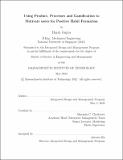| dc.contributor.advisor | Chatterjee, Sharmila C. | |
| dc.contributor.author | Gupta, Harsh | |
| dc.date.accessioned | 2022-08-29T16:13:53Z | |
| dc.date.available | 2022-08-29T16:13:53Z | |
| dc.date.issued | 2022-05 | |
| dc.date.submitted | 2022-06-28T20:30:26.577Z | |
| dc.identifier.uri | https://hdl.handle.net/1721.1/144819 | |
| dc.description.abstract | Mental health issues have been increasing at an alarming rate, with 35 percent of the world dealing with stress daily. Stress is one of the many other mental health issues that we face and practicing mindfulness has proven to be a strong contender in dealing with these issues. Still, it has not been easy for millennials to form a habit of carrying out this preventative measure. To test the hypothesis, we first explored drive and expectancy theories, concluding with the understanding that users take actions to solve their needs. User behavior is driven by internal and external incentives, which leads us to understand the critical role products and processes play in guiding their motivation. A product forms the basis of the initial trigger to start a habit formation journey, leading to action, which gets enhanced by rewards to foster adoption. A new habit formation model has been developed that considers user motivation, product, processes, and gamification. We propose a unique combination of a hand-held device (hardware) and an app to assist users in forming a habit to practice mindfulness. | |
| dc.publisher | Massachusetts Institute of Technology | |
| dc.rights | In Copyright - Educational Use Permitted | |
| dc.rights | Copyright MIT | |
| dc.rights.uri | http://rightsstatements.org/page/InC-EDU/1.0/ | |
| dc.title | Using Product, Processes and Gamification to Motivate users for Positive Habit Formation | |
| dc.type | Thesis | |
| dc.description.degree | S.M. | |
| dc.contributor.department | System Design and Management Program. | |
| mit.thesis.degree | Master | |
| thesis.degree.name | Master of Science in Engineering and Management | |
